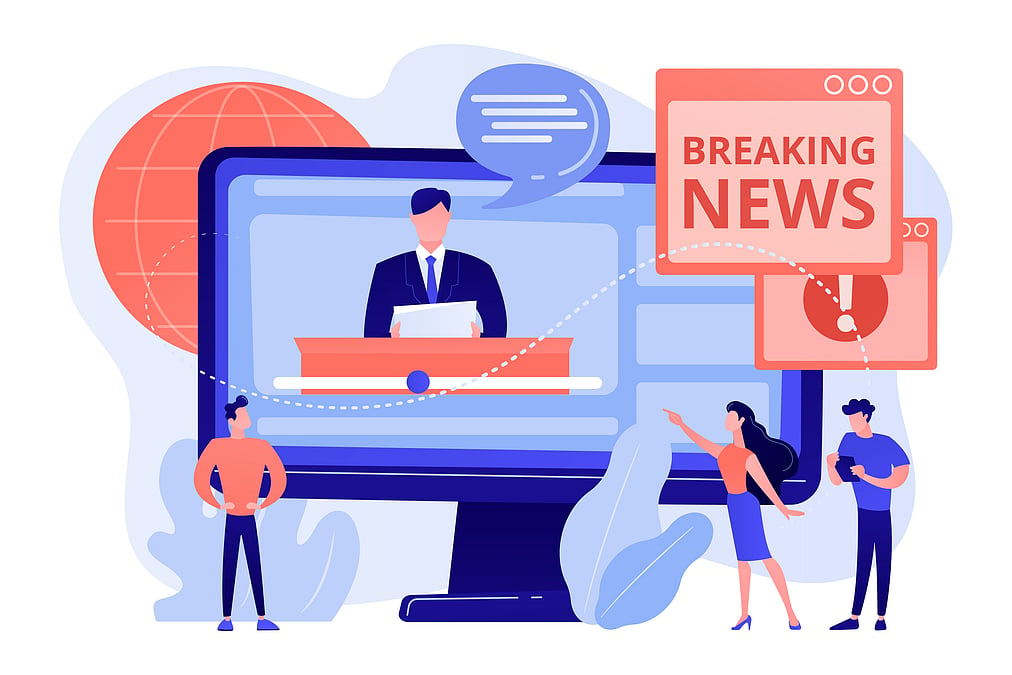Getting My Online News To Work
Getting My Online News To Work
Blog Article
Some Known Questions About Online News.
Table of ContentsThe Ultimate Guide To Online NewsThe Main Principles Of Online News The smart Trick of Online News That Nobody is DiscussingOnline News - TruthsOnline News Fundamentals Explained
Numbers for the proportion of people paying for online information were within the margin of mistake for both surveys. Allow's very first consider individuals who have accessibility to news that you would typically have to pay for. It makes good sense to start right here since some individuals have access to paywalled information through cost-free trials, using their job, and more.There are various forms of access, yet the three most typical are memberships to on-line news from a solitary brand, memberships to a print/digital bundle from a solitary brand name, and a registration to numerous brand names aggregated in one location. Of these, digital-only memberships to a solitary brand are one of the most common type of gain access to in all three nations.
Paid information collectors are fairly popular in the United States, primarily many thanks to Apple News+, but right now these are much less typical than memberships to solitary information brand names. As we saw in the Exec Summary, people primarily have accessibility to among a tiny team of popular brands. In the United States, over fifty percent of these individuals have accessibility to either the New York Times or the Washington Post, and in the UK, it's The Times or the Telegraph.
A Biased View of Online News
However, a lot of this team have gain access to because they are paying for registrations with their own money 75% in Norway and the UK, and 84% in the United States. For under-45s the number is lower. Yet among those 45 and over, the vast majority of those who have access are paying with their very own money.
In the United States and specifically Norway, several authors have introduced paywalls, which indicates even more people will be asked to pay probably enhancing a feeling of deficiency and creating a feeling that information could be worth paying for. In the UK, by contrast, only a relatively handful of magazines try to bill for news.
Hereof it is fascinating to compare the various reasons subscribers give up the USA and UK for spending for on the internet information. Overall, one of the most crucial aspect is the diversity and high quality of the web content. In both nations, clients believe they are getting far better info than from totally free resources.

Some Of Online News
These additional aspects appear to be specifically useful for retention as they develop habit and are less replicable in other places. For Norwegians as well the diversity of web content triumphed along with ease and convenience of use. 'Aftenposten is a serious paper with excellent quality', claimed one participant, however it was striking that 'sustaining excellent journalism' is less of a motivation (21%) maybe because traditional media electrical outlets are viewed as less polarised in Norway.
In addition, around half of those that presently have complimentary accessibility claim that they may start paying if their complimentary gain access to runs out. This is motivating, and possibly more encouraging still is that these figures suggest retention prices that are equivalent to those for subscriptions to video clip and audio streaming solutions like Netflix and Spotify.
It can also be seen as a helpful suggestion that people do not necessarily subscribe forever, and flaunts concerning the variety of 'brand-new clients' might not be informing the whole story (Online News). There's substantial 'spin' in this area, as many individuals official source finish their cost-free trials prior to they have to pay, or simply cancel their registrations to invest their money on various other points
Women, 37, Norway It cost means also much and I can get round the paywall. Male, 36, United States Too costly, felt there was absolutely nothing I could not get free of cost on Apple Information. Women, 19, UK In the UK, the variety of people that used to have actually access to paid information (10%) is close to the variety of people that currently have access (9%) with the equivalent figures from the US and Norway greater still (albeit less than the variety of people with accessibility).
How Online News can Save You Time, Stress, and Money.
As we've already seen, existing subscribers are fairly happy, yet with revenue from electronic marketing unpredictable lots of authors will be seeking to boost the number of new useful site customers. In contrasting our 3 nations we see some fascinating differences that could notify author methods. Initially, we observe a really high percentage (40% in the US and 50% in the UK) who say that nothing could encourage them to pay.
Yet in Norway, where rate of interest in information has a tendency to be greater and where free information is a lot more limited only 19% state they could not be persuaded. Price and convenience are a few of the crucial aspects that might make a difference. In Norway, a third (30%) claim they might subscribe if it was less expensive and 17% if they can pay to access several sites from a solitary settlement.
Publishers have actually significantly been offering differential pricing to select up company from those not likely to pay full price (e.g. abroad clients and students). Paying to stay clear of invasive advertisements is one more prospective route for publishers, with around one in 7 participants in all 3 nations claiming this this might tempt them to subscribe.

The Main Principles Of Online News
The fear of missing out on out can be an effective obstacle. Some outlets now ask viewers to register with them in order to be able to access a handful of write-ups for complimentary. Many reporters would certainly see this as a reasonable trade-off, yet the public are much more wary. In all 3 countries less than half assume signing up is a reasonable trade, but it's also clear that people are not strongly opposed either.
In between 13% and 22% in our 3 countries say they signed up to access news material in the last year. Some are additionally go to these guys using various other methods to navigate paywalls such as resetting cookies, transforming their web browser setups, and even downloading and install dedicated software. Simply a 3rd say they have ever tried to do something like this, as it calls for a specific degree of digital proficiency, and numerous are possibly not aware that is an opportunity.
People have various sights about the rights and wrongs of trying to avoid paywalls. Few would argue that this is always understandable, but some people do have bookings around essential public-interest journalism only being readily available to those willing and able to pay for it. A paywalled expositions of the UK government's handling of the coronavirus outbreak by the Sunday Times brought about a warmed argument about the issue on Twitter, with some attempting to openly share the full write-up.
Report this page